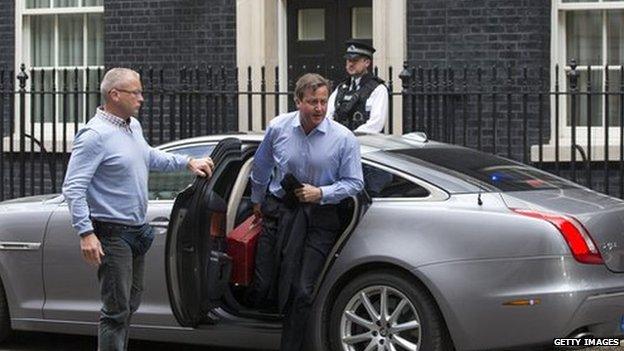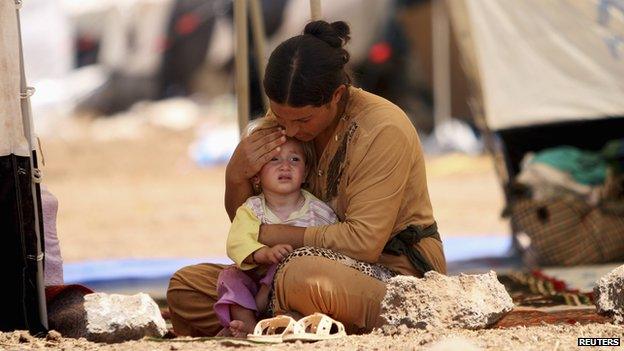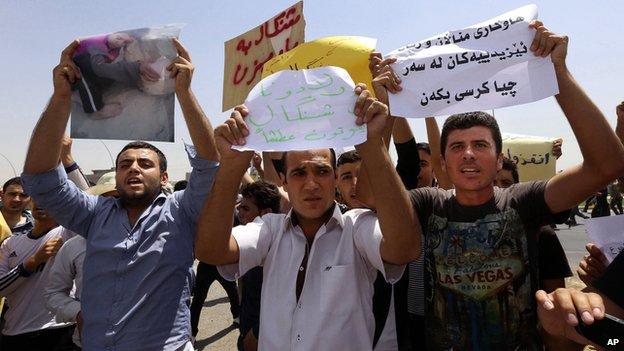James Foley's beheading was 'shocking and depraved' - PM
- Published
David Cameron: "This is not a time for a knee-jerk reaction"
Prime Minister David Cameron has said the beheading of a US journalist by an Islamic State militant with an English accent was "shocking and depraved".
James Foley, 40, had been missing since he was seized in Syria in 2012.
Mr Cameron has returned from his holiday to chair emergency meetings on the situation in Iraq and Syria.
Police and Whitehall officials are understood to be trying to identify the man suspected of the killing.
The Metropolitan Police said it was investigating video footage posted online showing Mr Foley being killed.
It warned that "viewing, downloading or disseminating" the video may be an offence under terrorism legislation.
Mr Cameron said on Twitter, external: "If true, the murder of James Foley is shocking and depraved. I will today chair meetings on the situation in Iraq/Syria."
Number 10 said the prime minister, who had been in Cornwall with his family, would meet senior Home Office and Foreign Office officials.
The White House said it had analysed the video footage and "reached the judgement that this video is authentic".
Earlier Foreign Secretary Philip Hammond told BBC Breakfast the government was aware of "significant numbers" of British nationals involved with extremist organisations overseas.
He acknowledged the suspected killer of Mr Foley spoke with an English accent but said further analysis of the footage was needed.
'Very grave'
"We're absolutely aware that there are significant numbers of British nationals involved in terrible crimes, probably in the commission of atrocities, making jihad with Isil [now known as IS] and other extremist organisations," he said.
"This is something we have been tracking and dealing with for many many months and I don't think this video changes anything.
"It just heightens awareness of a situation which is very grave and which we've been working on for many months."
Phillip Hammond says it appears the Islamic State militant appears to have a British accent
It is estimated that IS, which has seized large parts of northern Iraq and Syria, has up to 400 recruits from the UK in its ranks.
Some 69 people suspected of Syria-related jihadist activities have now been arrested in the UK.

David Cameron has returned from holiday to chair meetings on Iraq and Syria
Mr Hammond said the involvement of British nationals with extremist groups was one of the reasons that IS "represents such a direct threat" to the UK's security.
He added: "Many of these people may seek at some point to return to the UK and they would then pose a direct threat to our domestic security."
That would be especially likely if IS was "pushed back", leaving its foreign fighters to return to their country of origin, said Mr Hammond.
"We would see these people going back and potentially carrying on their fighting in our own homelands," he added.
'Absolute horror'
In the video, titled A Message to America, Mr Foley is wearing an orange jumpsuit, kneeling in desert-like terrain beside an armed man dressed in black.
The masked militant, who speaks with an English accent and identifies himself as an IS member, says the journalist's death is retaliation for US air attacks against IS targets in Iraq.
Sunday Times photographer Paul Conroy: "Without him, it will be darker"
The foreign secretary felt "absolute horror" at the "brutal execution", he told BBC Radio 4's Today programme.
Mr Foley's mother Diane said on Facebook, external she was proud of her son, who had reported extensively across the Middle East, working for America's Global Post and other media outlets including the French news agency AFP.
"He gave his life trying to expose the world to the suffering of the Syrian people," she wrote.

Thousands of people from the minority Yazidi community have fled their homes in Iraq

Many are calling for international protection from militants
Sunday Times photographer Paul Conroy, who worked alongside Mr Foley in 2011, said: "Without him... these tyrants will get away with things without people probing and pushing to show people what's really happening in these war zones."
Shadow home secretary Yvette Cooper told the BBC the government should be doing more to extend its anti-extremism strategy and accused ministers of watering down control orders for terror suspects.
The killer speaks with a British accent, as the BBC's Frank Gardner reports. Some listeners may find parts of this audio disturbing.
Frank Gardner, the BBC's security correspondent, said the video could encourage people to join IS.
"It attracts the worst kind of psychopaths," he said. "This is not about religion. It's not even about territory."
Of the beheading, he added: "It is utterly cowardly - killing, in a very sadistic and cruel and graphic way a defenceless civilian, a journalist, because you can't get to your real enemies."
'Vicious' British fighters
Shiraz Maher, from King's College London's International Centre for the Study of Radicalisation, said that British IS recruits were "not there to take a back seat role" and that many were becoming "hardened killers".
He told Today: "Unfortunately the British participation in the conflicts now raging in both Syria and Iraq has been one of full participation, one that has seen them at the front lines, taking part in the conflict in every way.
"So we have seen British fighters out there operating as suicide bombers; we have seen them operating as executioners.
"Unfortunately they are amongst some of the most vicious and vociferous fighters who are out there."
Qari Asim, imam at the Makkah mosque in Leeds, told BBC News the risk of young British Muslims joining the fighting was "getting greater because of our... involvement in Iraq".
He called on the Muslim community to "work with intelligence services and the government and everyone else to make sure that this poison doesn't reach our borders".